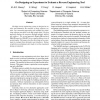121 search results - page 2 / 25 » An evaluation of reverse engineering tool capabilities |
WCRE
1996
IEEE
14 years 1 days ago
1996
IEEE
WCRE
2003
IEEE
14 years 1 months ago
2003
IEEE
Reverse Engineering is a process fraught with imperfections. The importance of dealing with non-precise, possibly inconsistent data explicitly when interacting with the reverse en...
WCRE
2002
IEEE
14 years 24 days ago
2002
IEEE
Today, software-engineering research and industry alike recognize the need for practical tools to support reverseengineering activities. Most of the well-known CASE tools support ...
IEEEIAS
2007
IEEE
14 years 2 months ago
2007
IEEE
An obfuscation aims to transform a program, without affecting its functionality, so that some secret data within the program can be hidden for as long as possible from an adversar...
WCRE
2003
IEEE
14 years 1 months ago
2003
IEEE
There are many reasons why reverse engineering research tools often fail to be evaluated or adopted in industry. Their rough user interfaces and poor interoperability are just two...

